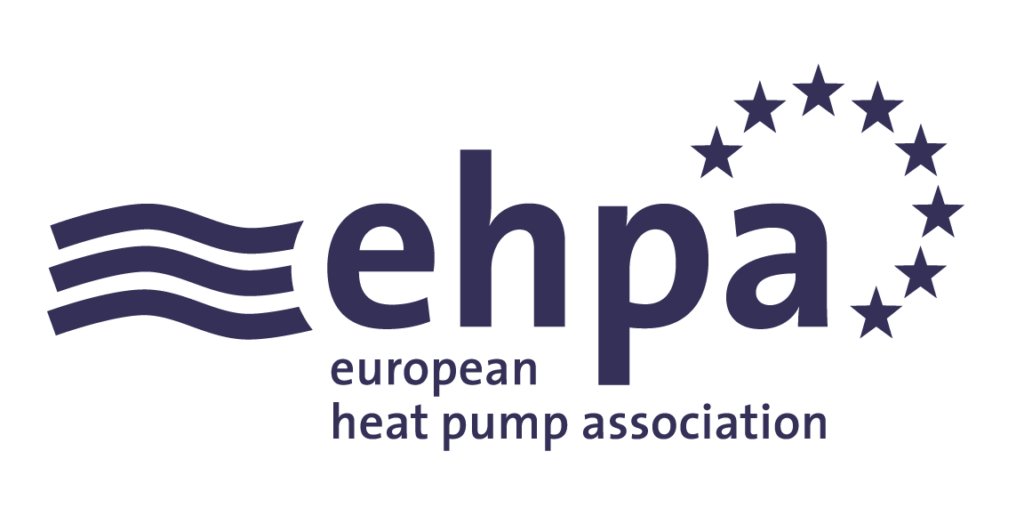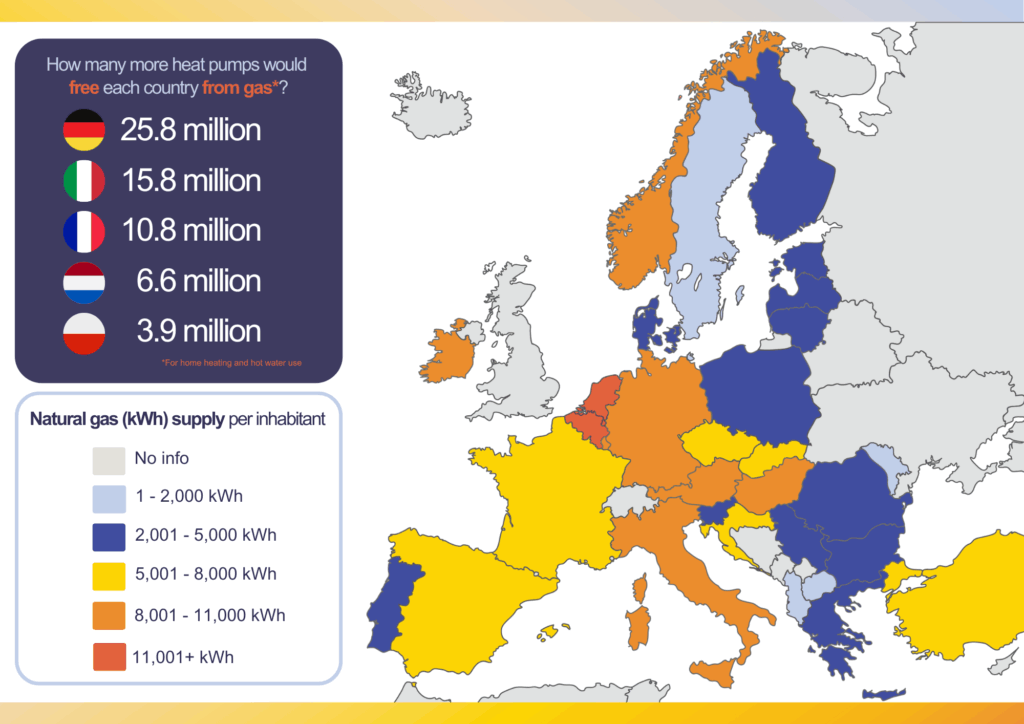If just 7% of European homes – around 14 million altogether – swapped their fossil fuel boiler for a heat pump it would cut 13 billion cubic metres of gas, which is equivalent to the amount the EU imports for home and water heating from Russia*. This is according to figures released today by the European Heat Pump Association (EHPA).
Europe has around 26 million domestic heat pumps as of end 2024, so this would be a rise of around 55%. These heat pumps already avoided 24 billion cubic metres of gas** (bcm) in 2024. The EU has a 2030 target of 60 million heat pumps.
Heat pumps are up to five times as energy efficient as a boiler, so the only gas they use is a small amount of whatever is in the country’s electricity mix, which is always far less than even the most efficient fossil fuel boiler. The European Commission has calculated that greater heat pump take-up and home efficiency could save €60 billion thanks to avoided fossil fuel imports.
EHPA is publishing a leaflet on the heat pump sector’s contribution to energy security as it holds a breakfast debate on the topic in the European Parliament, hosted by Thomas Pellerin-Carlin MEP.
Paul Kenny, Director General of EHPA said:
“Europe’s reliance on imported fossil fuels puts citizens at the mercy of unreliable suppliers and erratic prices. We must shift to strategic energy security via sustainable, secure, efficient, home-grown heating solutions. A clear Europe-level strategy to accelerate heat pump deployment is needed, alongside electricity pricing that makes heat pumps the most competitive option.”
Thomas Pellerin-Carlin MEP said:
“I am proud to host this timely discussion on how we can close the European energy security gap. Accelerating the electrification of heating is vital to reduce our dependence on Russian gas, keep our dependence on US LNG in check, and ultimately build a more secure, sustainable and affordable energy system for all citizens, businesses and local communities.”
Lukasz Kolinski, European Commission Director, Green Transition and Energy System Integration said:
“The decarbonisation of heating and cooling directly contributes to Europe’s energy security: wider heat pump adoption and better home efficiency can help the EU reduce its fossil fuel import spending by EUR 60 billion by 2030.”
Barbara Priesching, Group Director, Region West, Vaillant said:
‘As leading manufacturer for heating appliances, we are strongly committed in transforming our business towards Heat Pumps and will continue to invest in the development of innovative products, solutions and in our people. Therefore, let’s keep going, with strongest efforts!’
Daniel Wetzel, Head of the Tracking Sustainable Transitions Unit, International Energy Agency IEA said:
“In the immediate aftermath of Russia’s invasion of Ukraine, the International Energy Agency issued a 10-point plan for the EU to reduce its natural gas dependence, where we highlighted heat pumps could reduce gas demand by 7 bcm by 2025. The EU has successfully lowered their natural gas imports by around 60 bcm against 2021 levels, and based on IEA’s latest assessment, reduced demand from heat pumps installed represent as much as 10% of this total.”
Altogether, the EU imported 51.7 bcm of gas from Russia in 2024 – about 19% of its total gas imports. To replace all imported gas used for household space heating and water heating, Europe would need to install nearly 72 million more heat pumps, a rise of close to 180%.
For the heat pump sector to grow, stability and predictability are essential. EHPA urges European governments to swiftly implement the EU Green Deal policies without change. The upcoming Emissions Trading System 2 – which will put a price on carbon emissions from heating and transport – will provide up to €65 billion via the Social Climate Fund to accelerate the deployment of heat pumps and other clean technologies.
Driving heat pump roll-out will in turn drive investment in European manufacturing and jobs, boosting competitiveness and growing the 300 current heat pump & component production sites and over 416,000 direct and indirect jobs.
On 24 and 25 April 2025, the IEA and the UK government are holding an international Summit on the Future of Energy Security in London. This will be attended by European Commission president Ursula von der Leyen.
*Deploying fourteen million heat pumps could eliminate the equivalent of the Russian gas used for space and water heating in the EU. In 2024, Russian gas imports accounted for 19% of total EU gas imports, 51.7 bcm of gas through pipelines and LNG. It is considered here that 24.8% of those imports, as for any other import of gas or EU domestic production, will be used by households for space and water heating, that is 12.8 bcm to be replaced, see note below for how.
**This is based on the assumption that a heat pump would replace a gas boiler – for space heating, water heating, or both. The final energy consumption for these needs averages around 11,000 kWh per household across the EU. On average, a heat pump would cover the entire final energy demand of one household, effectively replacing the total consumption previously met by a gas boiler.



